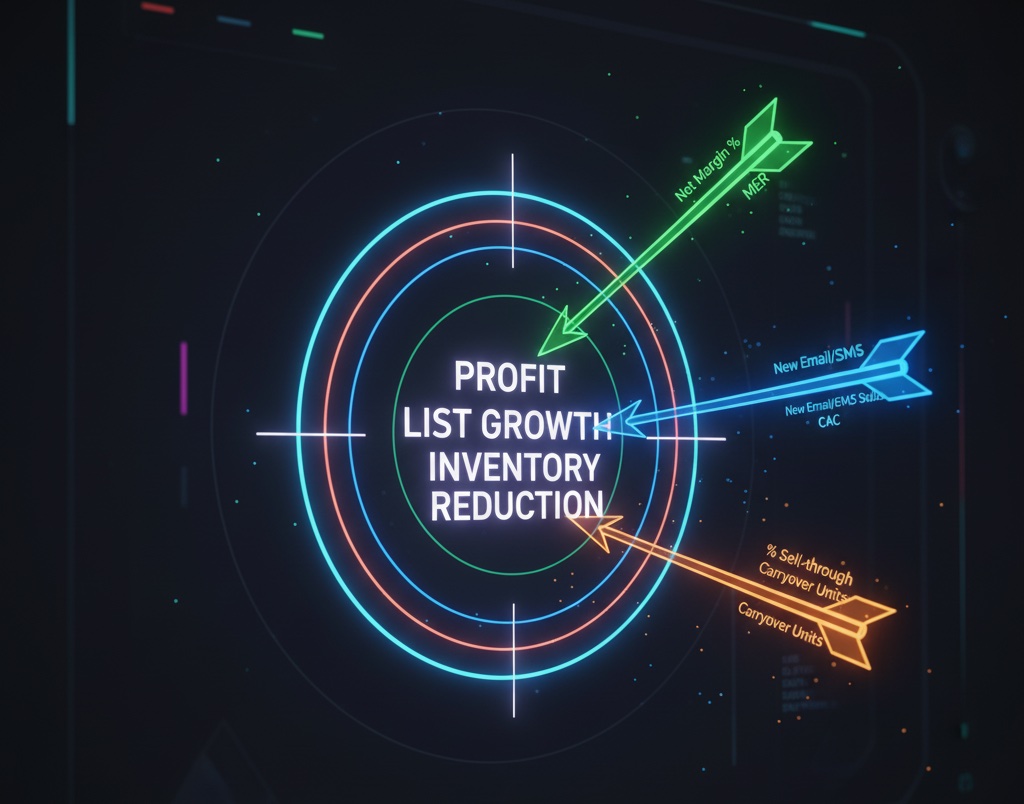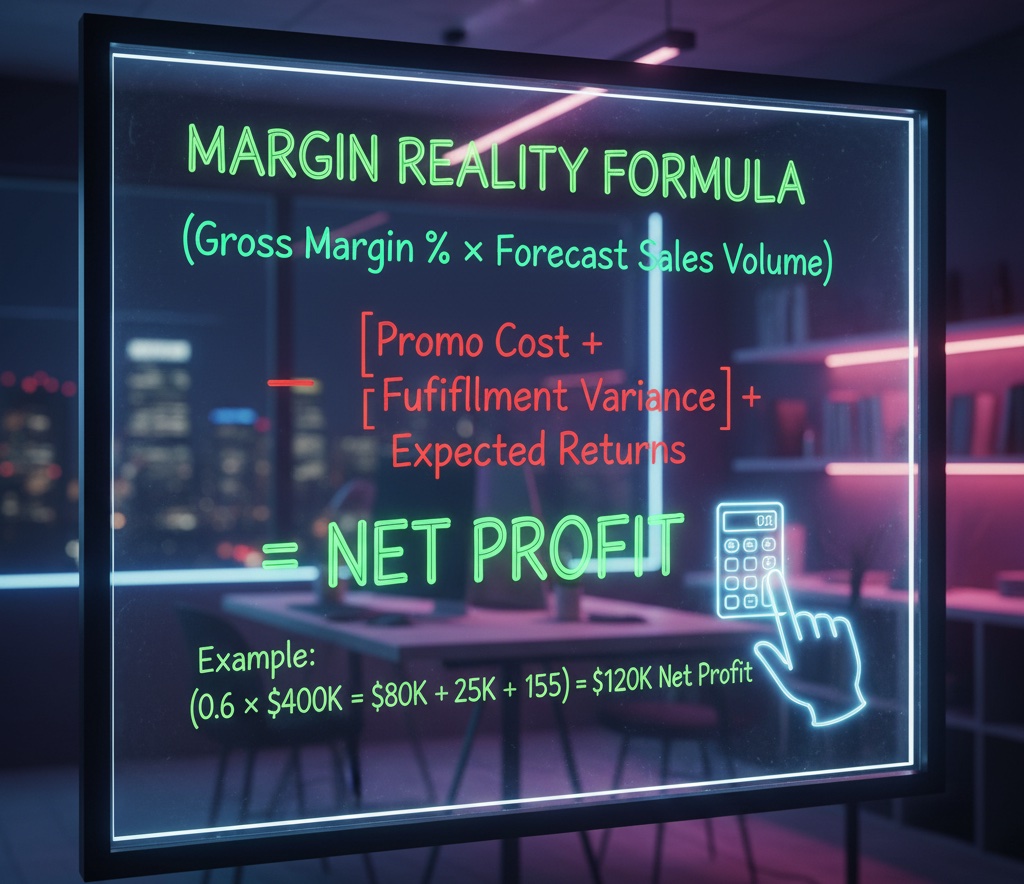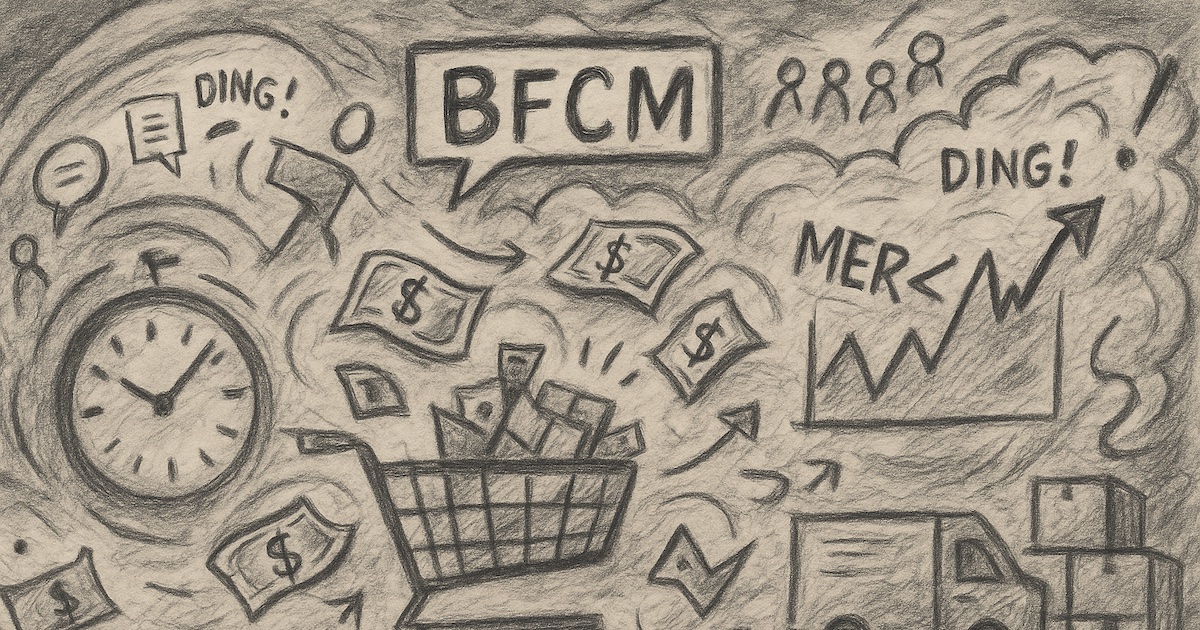Black Friday–Cyber Monday (BFCM) isn’t a marketing holiday; it’s an operational stress test.
For one weekend, your Shopify store runs at maximum capacity — and every weak point in your system gets exposed.
In 2024, U.S. online Black Friday spending hit $10.8 billion, up 10% year over year.1 Shopify merchants processed $4.1 billion in sales in 24 hours — a 22% YoY increase.2 DTC brands captured over $2 billion across the BFCM weekend.3
And yet, many operators finish the week wondering if they actually made money. This guide fixes that. It’s built for operators who measure in margins and lead times, not likes.
Table of contents
Phase 1: Planning — The Real Work Happens Before November
Operator Principle: Plan like finance, execute like marketing.
Step 1. Define Success and Align on Metrics

BFCM only works when your metrics match your mission. Choose one primary goal — profit, list growth, or inventory reduction — and align all actions to it.
| Objective | Primary KPI | Secondary KPI | Example Target |
|---|---|---|---|
| Profitability | Net Margin % | MER | ≥ 25 % margin, MER > 3.0 |
| List Growth | New Email/SMS Subs | CAC | +30 % list growth, CAC < LTV/3 |
| Inventory Clearance | % Sell-through | Carryover Units | 90 %+ clearance on seasonal SKUs |
MER = Total Revenue ÷ Total Ad Spend.
Monitor hourly during BFCM; < 2.5 means your offer or creative is leaking.
DTC founders are shifting focus from “record revenue” to profit-first planning.4
Step 2. Model the Offer with the Margin Reality Formula

Your discount isn’t “marketing” — it’s a cost center.
Run this before launching any promo:
(Gross Margin % × Forecast Sales Volume)
– (Promo Cost + Fulfillment Variance + Expected Returns)
Definitions
- Promo Cost = Discount % × Forecast Revenue
- Fulfillment Variance = Peak 3PL fees + Overtime labor
- Returns ≈ Average Return Rate × COGS
Example
If you forecast $400k sales at 60% gross margin and offer 20% off, with $25k extra 3PL costs and $15k returns:
(0.6 × 400k) – (80k + 25k + 15k) = $120k net profit → 30% net margin.
Finance Shortcut: If your Promo Cost + 3PL Variance exceeds 50% of gross profit, your “sale” is eating you alive.
Step 3. Build the 3×3 Promo Grid
Nine combinations = every customer covered without chaos.
| Segment | Primary Offer | Backup Offer | VIP Angle |
|---|---|---|---|
| New Customers | Sitewide 20 % off | Free Shipping + Gift | “First-Time Buyer Early Access” |
| Returning Customers | Tiered (15/20/25 %) | Loyalty Credit | “Member Bonus Gift” |
| Lapsed Customers | “Win-Back Bundle” | Free Gift | “We Miss You + 20 % Off” |
Average discount depth hit 19 % on Black Friday vs 9 % pre-BFCM.5
Use this to anchor your range.
Operator Tip: Pre-build these discount codes in Shopify Discounts, name them by segment, and sync with Klaviyo flows.
Step 4. Forecast Inventory with 3 Scenarios

Model Conservative, Base, Aggressive to keep cashflow safe.
| Scenario | Sales Volume | Units Needed | Buffer |
|---|---|---|---|
| Conservative | –20 % vs LY | 80 % LY units | 5 % |
| Base | = LY | 100 % | 10 % |
| Aggressive | +30 % vs LY | 130 % | 15 % |
Reconcile Shopify stock vs 3PL inventory by October 15.
Lack of real-time visibility is a top failure point.6
Ops Checklist
☑ Inventory counts match Shopify
☑ Packaging confirmed
☑ Carrier pickup schedule verified
☑ Promo SKUs QA’d and tagged
Step 5. Prep Customer Support
- Write macros for FAQs.
- Add delayed-shipment trigger in Klaviyo.
- Forecast 1.8× normal ticket volume.
- Update return policy page before launch.
Step 6. Timeline Discipline
60 % of consumers start shopping before Thanksgiving;7 42 % start before November.8
| Week | Focus |
|---|---|
| Sep 1–7 | Finalize offer & forecast inventory |
| Sep 8–30 | Creative briefs + design |
| Oct 1–20 | QA assets + schedule |
| Nov 1–10 | Warm-up emails + ads |
| Nov 25 (BFCM) | Execute + monitor |
The BFCM Ops Scorecard
| Area | 1 = Unready | 5 = Ready |
|---|---|---|
| Offer Modeling | ||
| Inventory Forecast | ||
| Creative Assets | ||
| Fulfillment Capacity | ||
| Customer Support | ||
| Cashflow Runway |
Score ≥ 22 = Go. Otherwise, reduce scope.
Phase 2: Marketing Asset Production & QA
Core Idea: Systems ship sales. Creatives just decorate them.
Step 1. The Asset Master Plan
For a 5-day sale window:
| Channel | Volume | Purpose |
|---|---|---|
| 8–10 | 2 warm-up + 3 launch + 3 reminder + 2 final hour | |
| SMS | 4–6 | Early access / Live launch / Cart reminders |
| Meta Ads | 10–12 | 3 cold / 3 retarget / 3 UGC / 3 carousel |
| Google PMax | 3 groups | Product + Sale + Brand defense |
| Organic Social | 10–15 | Stories / BTS / Customer reviews |
Each asset should trace to a Creative Brief: objective, segment, offer, format, owner, due date.
Operator Tip: 1 hour spent on a clear brief = 5 hours saved in revision loops.
Step 2. Leverage the Shopify Stack
- Klaviyo for email/SMS with Shopify segments
- Shopify Launchpad for automated price changes
- Shopify Audiences → Meta for high-match retargeting (only available with Shopify Plus)
- Google Drive + Notion for asset sign-off
- QA Checklist: coupons apply, UTMs track, mobile layout holds, checkout < 2.5 s
79 % of BFCM traffic came from mobile — test on both iOS and Android.9
Step 3. Modern Extensions
| Tactic | Timeline | Goal |
|---|---|---|
| Influencer Campaigns | Ship PR kits 4 weeks out | Warm awareness |
| Live Shopping | TikTok Shop / Amazon Live week-of | Spike AOV + trust |
| UGC Content | Gather through Billo or Insense | Ad creative refresh |
Phase 3: Execution — Operate Like a Control Room
Your Goal: No surprises. Only metrics.
Step 1. Live Dashboard
| Metric | Source | Frequency | Alert |
|---|---|---|---|
| MER | Meta + Shopify | Hourly | < 2.5 |
| AOV | Shopify | Hourly | –10 % vs forecast |
| Fulfillment Lag | 3PL | 2× daily | > 48 hr |
| CS Volume | Gorgias | Daily | > 2× baseline |
Set Slack alerts via Zapier.
Black Friday represents 4.1 % of total holiday ecommerce revenue — downtime hurts.10
Read: Marketing Dashboard Metrics: How to Build Executive-Proof Dashboards
Step 2. Communication Rhythm
AM Sync (10 min): Marketing + Ops + CS — status + risks
Midday Check-in: ROAS review + inventory update
EOD Debrief: Log exceptions and root causes
Operator Shortcut: Track every incident in one Google Sheet titled “Next Year’s Fix List.”
Phase 4: Post-Sale Review — Turn Performance into Process
Step 1. Profit & Ops Analysis
From Shopify + QuickBooks:
| Metric | Goal |
|---|---|
| MER vs Forecast | ± 0.2 |
| Net Margin % | ≥ 25 % |
| Fulfillment Delay | < 48 hr |
| Refund Rate | < 4 % |
| Unsubscribe Rate | < 1 % |
Profitability > Revenue.
Step 2. Conduct the Post-Mortem
Create a Notion table with: What Worked / What Broke / Next Action.
Feed into your Promo Calendar × Inventory Planner.
Assign owners and deadlines — lessons expire fast.
For Microbrands: The Lean Stack
| Function | Tool | Time Investment |
|---|---|---|
| Offer & Inventory | Shopify Discounts + Sheet | 2 hrs |
| Email/SMS | Klaviyo 3-Email + 2-SMS | 3 hrs |
| Ads | 2 UGC Videos + 1 Carousel | 4 hrs |
| Support | Gorgias Macros | 1 hr |
You can ship profitably with discipline, not scale.
Key Takeaways
- BFCM tests systems, not luck.
- Shopify is your control room.
- Model margin first, discount second.
- QA everything mobile-first.
- Document your failures so next year feels boring — the operator’s definition of success.
FAQ
By early September. Creative and inventory work backward 8–10 weeks from launch.
Between 3.0 and 4.0 for most DTC brands; anything under 2.5 requires immediate diagnosis.
8–10 minimum: 2 warm-ups, 3 launch, 3 reminders, 2 final hours.
References
- https://statistics.blackfriday/ ↩︎
- https://news.shopify.com/shopify-merchants-break-records-black-friday-2024 ↩︎
- https://www.triplewhale.com/blog/bfcm-2024-trends ↩︎
- https://www.modernretail.co/marketing/dtc-briefing-how-startups-are-factoring-profit-into-their-black-friday-calculus ↩︎
- https://www.tresl.co/bfcm2024 ↩︎
- https://www.finaloop.com/blog/why-this-2024-bfcm-is-a-lesson-in-inventory-cash-flow-and-financial-data ↩︎
- https://business.adobe.com/resources/holiday-shopping-report.html ↩︎
- https://forgedigitalmarketing.com/how-dtc-brands-prepare-for-black-friday-and-cyber-monday ↩︎
- https://www.adobe.com/analytics.html ↩︎
- https://redstagfulfillment.com/ecommerce-sales-percentage-on-black-friday ↩︎

